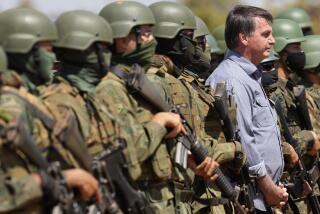Lessons From the People of the Philippines
- Share via
I take exception to William Pfaff’s comments (Editorial Pages, Feb. 26), “After the Party, Watch the Generals Maneuver.”
Pfaff notes that Philippine Defense Minister Juan Ponce Enrile and Lt. Gen. Fidel V. Ramos were critical in the overthrow of Marcos, but continues to reach a conclusion that because they are associated with the military, they cannot contribute to the continuing development of democracy.
This is a ridiculous view, rather like “type casting” all military as wearers of black hats, regardless of their personal qualities or beliefs. Your readers should know a little more about Gen. Ramos to make a more intelligent analysis of what role he may play in the future of the Philippines.
“Eddie” Ramos graduated from West Point, 63rd in a class of 669. He was commissioned in the Corps of Engineers of the Philippine Army, and remained in the United States to earn his master’s degree in civil engineering from the University of Illinois. During these five years, Ramos learned about U.S. democracy, and about the attitudes of the U.S. military in a role subordinate to civil leadership.
Subsequently, Ramos fought in one of the Philippine battalions as a part of the U.S. 45th Infantry Division in the Korean War, and again fought with the United States as part of the Philippine contingent in Vietnam. During the peaceful interims he created and commanded the Philippine Special Forces--the equivalent of our Green Berets--and earned a reputation as a professional in a military establishment where politics did play a greater role than our own. His ability to command the respect and loyalty of the Philippine military was based not on political charisma, but on earned leadership.
CLINTON E. GRANGER JR.
Santa Ana

